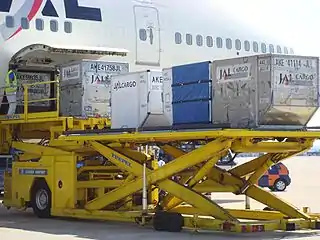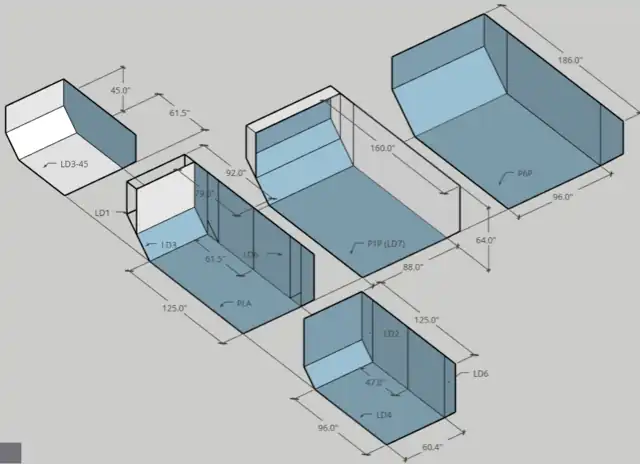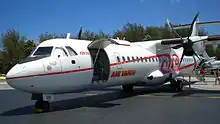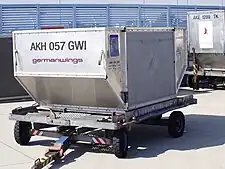Unit load device
A unit load device (ULD) is a container used to load luggage, freight, and mail on wide-body aircraft and specific narrow-body aircraft. It allows preloading of cargo, confidence the containerised load will fit in the aircraft and efficient planning of aircraft weight and balance and reduced labour and time in loading aircraft holds compared with 'bulk-loading' single items of cargo or luggage by hand. Each ULD has its own packing list or manifest so that its contents can be tracked. A loaded aircraft cargo pallet secured with a cargo net also forms an ULD, but its load must be gauged for size in addition to being weighed to ensure aircraft door and hold clearances.

The IATA publishes ULD regulations and notes there are 900,000 in service worth more than US$1 billion, averaging $1100 each.[1]
Types
ULDs come in two forms: pallets and containers. ULD pallets are rugged sheets of aluminium with rims designed to lock onto cargo net lugs. ULD containers, also known as cans and pods, are closed containers often times made of aluminium or a combination of aluminium (frame) and Lexan (walls) but there are examples of containers made of GRP with an insulating foam core. Depending on the nature of the goods to be transported, ULDs may have built-in refrigeration units. Examples of common ULDs and their specifics are listed below.
| Type | Internal volume |
Height | Depth | Width | Contour | IATA | Suitability | ||
|---|---|---|---|---|---|---|---|---|---|
| Base | Overall | Nominal | |||||||
| LD3-45[3] | 131 (3.7) | 45 (114.3) | 60.4 (153.4) | 61.5 (156.2) | 96 (243.8) | Full | Double | AKH | Airbus A319/Airbus A320/Airbus A321 |
| LD2 | 124 (3.5) | 64 (162.6) | 47 (119.4) | 61.5 (156.2) | Half | Single | APE | Boeing widebodies | |
| LD3 | 159 (4.5) | 61.5 (156.2) | 79 (200.7) | AKE | Airbus and Boeing widebodies, DC-10/MD-11, L-1011 | ||||
| LD1 | 175 (5.0) | 92 (233.7) | AKC | Boeing widebodies, MD-11 | |||||
| LD4 | 195 (5.5) | 96 (243.8) | 96 (243.8) | Full | None | AQP | Boeing 767/777/787 | ||
| LD8 (2×LD2) | 245 (6.9) | 125 (317.5) | Double | AQF | Boeing 767/787 | ||||
| LD11 | 256 (7.2) | 125 (317.5) | None | ALP | Boeing 747, 777, 787, DC-10/MD-11 | ||||
| PLA pallet[lower-alpha 1] | 250 (7.1) | PLA | 747, 777, 787 | ||||||
| LD6 (2×LD3) | 316 (8.9) | 160 (406.4) | Double | ALF | 747/777/787, DC-10/MD-11 | ||||
| LD26 (P1P base) | 470 (13.3) | 88 (223.5) | AAF | Airbus A330, A340, A350, and Boeing 747/777/787, DC-10/MD-11 | |||||
| LD7 winged pallet[lower-alpha 2] | 495 (14.0) | P1P | 747, 777, 787, DC-10/MD-11 | ||||||
| LD7/P1P pallet[lower-alpha 1] | 379 (10.7) | 125 (317.5) | None | P1P | All widebodies | ||||
| LD9 (P1P base) | 381 (10.8) | AAP | Boeing widebodies, DC-10/MD-11 | ||||||
| LD29 (P1P base) | 510 (14.4) | 186 (472.4) | Double | AAU | 747 | ||||
| LD39 (P6P base) | 560 (15.9) | 96 (243.8) | AMU | 747 | |||||
| P6P pallet[lower-alpha 1] | 407 (11.5)[lower-alpha 3] | 125 (317.5) | None | P6P | 747, 767, 777, 787, DC-10, MD-11 | ||||
- Notes
- Flat pallet with a cargo net
- The LD-7 winged pallet adds folding wings to the P1P flat pallet to allow overhang
- up to 750 cu ft (21.2 m3) with a 118 in (299.7 cm) height

Aircraft compatibility

LD3s, LD6s, and LD11s will fit 787s, 777s, 747s, MD-11s, Il-86s, Il-96s, L-1011s and all Airbus wide-bodies. The 767 uses the smaller LD2s and LD8s because of its narrower fuselage. The less common LD1 is designed specifically for the 747, but LD3s are more commonly used in its place because of ubiquity (they have the same floor dimensions such that one LD3 takes the place of one LD1). LD3s with reduced height (1.14 metres (45 in) instead of 1.63 metres (64 in)) can also be loaded on the Airbus A320 family. LD7 pallets will fit 787s, 777s, 747s, late model 767s (with larger doors), and Airbus wide-bodies.
Interchangeability of certain ULDs between LD3/6/11 aircraft and LD2/8 aircraft is possible when cargo needs to be quickly transferred to a connecting flight. Both LD2s and LD8s can be loaded in LD3/6/11 aircraft, but at the cost of using internal volume inefficiently (33 ft3 wasted per LD2). Only the LD3 of the LD3/6/11 family of ULDs can be loaded in a 767; it will occupy an entire row where two LD2s or one LD8 would otherwise have fit (90 ft3 wasted per LD3). Policies vary from airline to airline as to whether such transfers are allowed.
The 787, intended to replace the 767, was designed to use the LD3/6/11 family of ULDs to solve the wasted volume issue.[4]
ULD capacity
| Model | Lower deck | Main deck | ||||
|---|---|---|---|---|---|---|
| Containers | 88×125″ | 96×125″ | 96×125″ | 88×125″ | 88x108″ | |
| Airbus A300-600[5] | 22 LD3 | 4 + 10 LD3 | 4 + 10 LD3 | 20 | 21[6] | |
| Airbus A310[7] | 15 LD3 | 3 + 7 LD3 | 3 + 7 LD3 | 15 | 16[6] | |
| Airbus A330-2/800[8] | 26 LD3 | 8 | 8 | 22 | 23 | 26 |
| Airbus A330-3/900[8] | 32 LD3 | 11 | 10 | 26 | 26[9] | |
| Airbus A340-200[10] | 26 LD3 | 9 | 9 | |||
| Airbus A340-300[10] | 32 LD3 | 11 | 10 | |||
| Airbus A340-500[11] | 30 LD3 | 10 | 10 | |||
| Airbus A340-600[11] | 42 LD3 | 14 | 14 | |||
| Airbus A350-900[12] | 36 LD3 | 11 | 11 | |||
| Airbus A350F[13] | 40 LD3 | 12 | 30 | |||
| Airbus A350-1000[12] | 44 LD3 | 14 | 14 | |||
| Airbus A380-800[14] | 38 LD3 | 13 | 13 | |||
| Boeing 747 classic[15] | 30 LD1 | 28 | 28 | 36 | ||
| Boeing 747SP[15] | 20 LD1 | |||||
| Boeing 747-400[16] | 32 LD1 | 9 + 4 LD1 | 9 + 2 LD1 | 30 | 30 | |
| Boeing 747-8/8F[17] | 40 LD1 | 12 + 2 LD1 | 34 | |||
| Boeing 767-200[18] | 22 LD2 | 3 + 10 LD2 | 3 + 10 LD2 | |||
| Boeing 767-300[18] | 30 LD2 | 4 + 14 LD2 | 4 + 14 LD2 | 14 | 16 | 26 |
| Boeing 767-400[18] | 38 LD2 | 5 + 16 LD2 | ||||
| Boeing 777-200[19] | 32 LD3 | 10 + 2 LD3 | 10 | 27 | ||
| Boeing 777-300[19] | 44 LD3 | 14 + 2LD3 | 14 | 33[20] | ||
| Boeing 777-8F[21] | 40 LD3[22] | 13 | 31 | |||
| Boeing 777-9[23] | 48 LD3 | 16 | 14 + 4 LD3 | |||
| Boeing 787-8[24] | 28 LD3 | 9 | 8 + 2 LD3 | |||
| Boeing 787-9[24] | 36 LD3 | 11 | 11 | |||
| Boeing 787-10[24] | 40 LD3 | 13 | 13 | |||
| Douglas DC-10[25] | 26 LD3 | 5 + 8 LD3 | 22 | 30 | ||
| McDonnell Douglas MD-11[26] | 32 LD3 | 6 + 14 LD3 | 26 | 26 | 34 | |
| Lockheed L-1011[27] | 19 LD3 | 4 + 7 LD3 | ||||
| Ilyushin Il-86/Il-96-300[28] | 16 LD3 | |||||
| Ilyushin Il-96M/T[29] | 32 LD3 | |||||
| Model | Containers | 96×125″ | 88×125″ | 88x108″ |
|---|---|---|---|---|
| Airbus A319[30] | 4 LD3-45 | |||
| Airbus A320[31] | 7 LD3-45 | 11[32] | ||
| Airbus A321[33] | 10 LD3-45 | 14[32] | ||
| Boeing 707-320C[34] | no lower ULD | 13 | 13 | |
| Boeing 727-100C[35] | no lower ULD[lower-alpha 1] | 8 | 8 | |
| Boeing 737-200C[36] | no lower ULD | 7 | 7 | |
| Boeing 737-300SF[37] | no lower ULD | 9 | ||
| Boeing 737-400SF[38] | no lower ULD | 10 ½ | ||
| Boeing 737-700C[36] | no lower ULD | 8 | 8 | |
| Boeing 737-800SF[39] | no lower ULD | 11 ½ | ||
| Boeing 757-200F[40] | no lower ULD | 15 | ||
| Douglas DC-8-55F[41] | no lower ULD | 13 | ||
| Douglas DC-8-62/72F[41] | no lower ULD | 14 | ||
| Douglas DC-8-61/63/71/73F[41] | no lower ULD | 18 | ||
| Douglas DC-9-15F[42] | no lower ULD | 6 | ||
| Douglas DC-9-32F[42] | no lower ULD | 8 | ||
| McDonnell Douglas MD-80SF[43] | no lower ULD | 8 | 8 | 12 |
- The B727-200 had an option to hold 11 specific 45.5 in–92.4 in × 41.1 in × 43.4 in (1.16 m–2.35 m × 1.04 m × 1.10 m) base-full width × height × depth, 78 cu ft (2.2 m3) underfloor containers.

Aircraft loads can consist of containers, pallets, or a mix of ULD types, depending on requirements. In some aircraft the two types must be mixed as some compartments take only specific ULDs.
Container capacity of an aircraft is measured in positions. Each half-width container (LD1/LD2/LD3) in the aircraft it was designed for occupies one position. Typically, each row in a cargo compartment consists of two positions. Therefore, a full-width container (LD6/LD8/LD11) will take two positions. An LD6 or an LD11 can occupy the space of two LD3s. An LD8 takes the space of two LD2s.
Aircraft pallet capacity is measured by how many PMC-type LD7s 96 by 125 in (240 by 320 cm) can be stored. These pallets occupy approximately three LD3 positions (two positions of one row and half of the two positions of the following row) or four LD2 positions. PMCs can only be loaded in cargo compartments with large doors designed to accept them (small door compartments are container-only).

| Model | LD3 | 46×66” | 88×54” | 88×62” | 88×108” | 96×125” |
|---|---|---|---|---|---|---|
| Fokker 100[44] | 11 | |||||
| CRJ200[45] | 8 | |||||
| BAe 146-200[46] | 9 | 6 | 4 | |||
| ATR 72[47] | 7 | 9 | 5 | |||
| ATR 42[47] | 5 | 6 | 3 | |||
| Dash 8-300[48] | 9 | |||||
| Xian MA600[49] | 5 | 5 | ||||
| Short 360[50] | 5 | |||||
| Cessna SkyCourier[51] | 3 |
Identification

All ULDs are identified by their ULD number. A three-letter prefix identifies its type and key characteristics,[52] followed by a 4 or 5 digit serial number (4 if prior to October 1, 1993; either 4 or 5 if after October 1, 1993) to uniquely identify it from others of the same type, and ending with a two character (alpha-numerical) suffix identifying the ULD's owner (if an airline, often the same as IATA designator codes). For example, AKN 12345 DL means that the ULD is a forkliftable LD3 with the unique number 12345 and its owner is Delta Air Lines.[53]
| Type[lower-alpha 1] | Base size[lower-alpha 2] (depth × base width) | Contour/restraint[lower-alpha 3] (overall width × height) |
|---|---|---|
|
|
|
- Notes
- Identifies ULD category (certification, ULD type, thermal units).[53]
- Identifies standard base dimensions.[53]
- Identifies contour (profile dimensions and shape), forklift holes, and other miscellaneous information.[53] For certified pallets (Pxx), this identifies the NAS 3610 classification to which the pallet is certified.[54]
- Previously used as "Certified Main Deck Aircraft Container"; this designation is obsolete.
- This designation is obsolete.
- Previously used as "Structural Igloo – Solid Door"; this designation is obsolete.
- Previously used as "Structural Igloo – Other Closures" (meaning any door other than a solid door); this designation is obsolete.
Common prefixes


- AAA: LD7 container (88 in × 125 in or 2,235 mm × 3,175 mm), 81 in (2,057 mm) tall, contoured for maindeck narrow-body
- AAD: LD7 container (88 in × 125 in or 2,235 mm × 3,175 mm), 96 in (2,438 mm) tall, contoured for maindeck wide-body (aka A1)
- AAF:[55] LD26 container
- AAP:[55] LD9
- AAU:[55] LD29 container
- AAY: LD7 container (88 in × 125 in or 2,235 mm × 3,175 mm), 81 in (2,057 mm) tall, contoured for maindeck wide-body and narrow-body (aka A2)
- AAZ: LD7 container (88 in × 125 in or 2,235 mm × 3,175 mm), 64 in (1,626 mm) tall, contoured for maindeck wide-body and narrow-body and any belly (aka L9)
- AGA:[55] M2 container
- AKC:[55] LD1 without forklift holes
- AKE:[55] LD3 without forklift holes/half ALF
- AKH, AKW: LD3-45 mainly for A320/321, 45 in (1,143 mm) tall, same base as AKE, extensions on both sides
- AKN:[55] LD3 with forklift holes
- ALB:[55] LD4 with forklift holes
- ALD: LD11 container (aka L11)
- ALF:[55] LD6 without forklift holes
- ALP:[55] LD11 without forklift holes
- ALP:[55] LD4 without forklift holes
- AMA:[55] M1 container
- AMD:[55] M1H container
- AMJ: LD7 container (96 in × 125 in or 2,438 mm × 3,175 mm), 96 in (2,438 mm) tall, contoured for main deck wide-body (aka M1)
- AMU:[55] LD39 container contour similar to ALF, but deeper and bigger extensions. biggest lower-deck container
- AVY:[55] LD1 with forklift holes
- AWC:[55] LD6 with forklift holes
- AYY:[55] Demi, a half-width contoured container typically used for the main deck
- AYX:[55] AYY with fittings to connect a fire extinguisher so as to carry Dangerous Goods
- DPE:[55] LD2 without forklift holes
- DPN:[55] LD2 with forklift holes
- DQF:[55] LD8 with forklift holes
- FLA:[55] LD11 pallet
- FQA: LD8 pallet (same floor dimensions as DQF)
- HMA:[55] Horse stall
- KMA:[55] Sheep and goat pen
- P1P:[55] LD7, large pallet (88 in × 125 in or 2,235 mm × 3,175 mm), folding wings for overhang
- PAD:[55] LD7, large pallet (88 in × 125 in or 2,235 mm × 3,175 mm), flat
- PGA:[55] M6, large pallet (96 in × 238.5 in or 2,438 mm × 6,058 mm), freighter main deck only
- PLA:[55] LD11 pallet
- PMC: LD7, large pallet (96 in × 125 in or 2,438 mm × 3,175 mm)
- QKE: LD3 same as AKE but made of KEVLAR and designed to be bombproof. No forklift holes.
- RAP:[55] LD9 with refrigeration unit
- RAU:[55] LD29 container with refrigeration unit
- RKN:[55] LD3 with refrigeration unit
- RWB:[55] LD11 with refrigeration unit
- SAA: Full-sized version of the AYY
- SAX: Full-sized version of the AYX
- VRA:[55] M6, large pallet (96 in × 196 in or 2,438 mm × 4,978 mm), twin car rack
- XAW:[55] LD7, large pallet (88 in × 125 in or 2,235 mm × 3,175 mm), fixed wings for overhang
- XKC: LD3 without forklift holes/half ALF
Main-deck ULDs
On the main deck of cargo planes are 79 to 96 inches (2,007 to 2,438 mm) tall ULDs with footprints similar to those of 88 inches (2,235 mm) or 96 inches (2,438 mm) wide pallets and 62 inches (1,575 mm) or 125 inches (3,175 mm) long. A 62-inch (1,575 mm) wide × 88-inch (2,235 mm) tall ULD is half the volume of a 125-inch (3,175 mm) × 88 inch pallet. The 20 foot pallet is 238 inches (6,045 mm) long and 96 inches (2,438 mm) wide. What the actual dimensions of contoured upper deck ULDs are is very hard to know, because most manufacturers only profile width, length and height data.
There are several common types of contoured main deck ULDs, that are contoured (curved to fit in the plane's body) to provide as much cargo volume as possible. Initially ULD contouring was simply a triangle removed from one or two corners of the profile of the ULD, such as the common LD3 and LD6. Main deck ULDs use curves for the contoured shape to truly maximize cargo volume. Upper deck ULDs are just like lower deck ULDs that are either the full width of the plane with two corners of the profile removed (lower deck LD6 lower), or that container is cut in half, down the center line of the plane, (lower deck LD3 and upper deck AAX).
Main deck ULDs and pallets are not only taller than lower deck ULDs, they are frequently two or four times longer. They are usually organized like an LD6, using the width of the plane and missing two profile corners, or two very long LD3s, stored in parallel to use the plane's width and each missing one profile corner, but often twice or four times as long from plane's nose to tail.
Many air cargo companies use main deck ULDs that have both features called dual-profile, so that on smaller planes such as the Boeing 727, they are stored widthwise and have two corners contoured, and on the bigger Boeing 767, they can be rotated 90 degrees and shipped in parallel like LD3s, so that only one corner is contoured when being used like an LD3. This greatly simplifies transportation of cargo containers at slight cost of cargo volume.
See also
- 463L master pallet, used for military aircraft transport and airdrops
- AAR Corp, parent company of Nordisk Aviation, a manufacturer of ULDs
- Containerization
- Intermodal container
- Pallet
- Rio Tinto Alcan, formerly Alusuisse, a manufacturer of ULDs
- Shipping container
- Unit load
References
- "ULD Regulations". IATA.
- "Pallets and containers" (PDF). Boeing. 2012.
- "AKH (LD3-45)". Nordisk Aviation.
- Vogel, Gib (2013). Flying the Boeing 787. Ramsbury, Marlborough: The Crowood Press Ltd. p. 25. ISBN 978-1-84797-636-9. Retrieved 21 February 2019.
[The 787] interior fuselage width of 215in (5.46m) was to be 29in (0.74m) greater than the 186in (4.72m) width of the 767 to accommodate the more commonly available LD-3 size baggage containers in its cargo hold ...
- "A300-600 Aircraft Characteristics - Airport and Maintenance Planning" (PDF). Airbus. Dec 2009.
- "A300/A310 P2F" (PDF). Elbe Flugzeugwerke.
- "A310 Aircraft Characteristics - Airport and Maintenance Planning" (PDF). Airbus. Dec 2009.
- "A330 Aircraft Characteristics - Airport and Maintenance Planning" (PDF). Airbus. Jul 2018.
- "A330P2F" (PDF). Elbe Flugzeugwerke.
- "A340-200/300 Aircraft Characteristics - Airport and Maintenance Planning" (PDF). Airbus. Jul 2018.
- "A340-500/600 Aircraft Characteristics - Airport and Maintenance Planning" (PDF). Airbus. Jul 2018.
- "A350-900/1000 Aircraft Characteristics - Airport and Maintenance Planning" (PDF). Airbus. Jun 2018.
- "A350F Freighter key figures". Airbus.
- "A380 Aircraft Characteristics - Airport and Maintenance Planning" (PDF). Airbus. Dec 2016.
- "747-100/200/300/SP Airplane Characteristics for Airport Planning" (PDF). Boeing. May 2011.
- "747-400/-400ER Freighters" (PDF). Boeing. May 2010.
- "747-8/8F Airplane Characteristics for Airport Planning" (PDF). Boeing. Dec 2012.
- "767 Airplane Characteristics for Airport Planning" (PDF). Boeing. May 2011.
- "777 Airplane Characteristics for Airport Planning" (PDF). Boeing. May 2015.
- Kingsley-Jones, Max (2019-10-16). "GECAS and IAI launch 777-300ER cargo conversion". Flightglobal.
- "777-8 Freighter". Boeing.
- Bjorn Fehrm (July 23, 2015). "Options for Singapore Airlines to operate direct flights to the US, part 2". Leeham.
- "777-9 Airplane Characteristics for Airport Planning" (PDF). Boeing. May 2015.
- "787 Airplane Characteristics for Airport Planning" (PDF). Boeing. March 2018.
- "DC-10 Airplane Characteristics for Airport Planning" (PDF). McDonnell Douglas. May 2011.
- "MD-11 Airplane Characteristics for Airport Planning" (PDF). McDonnell Douglas. May 2011.
- "L-1011-500 TriStar technical profile" (PDF). Lockheed.
- Gerard Frawley. "Ilyushin Il-86". The International Directory of Civil Aircraft – via Airliners.net.
- Gerard Frawley. "Ilyushin Il-96M & Il-96T". The International Directory of Civil Aircraft – via Airliners.net.
- "A319 Aircraft Characteristics - Airport and Maintenance Planning" (PDF). Airbus. Feb 2018.
- "A320 Aircraft Characteristics - Airport and Maintenance Planning" (PDF). Airbus. Feb 2018.
- "A320/A321 P2F" (PDF). Elbe Flugzeugwerke.
- "A321 Aircraft Characteristics - Airport and Maintenance Planning" (PDF). Airbus. Feb 2018.
- "707 Airplane Characteristics for Airport Planning" (PDF). Boeing. May 2011.
- "727 Airplane Characteristics for Airport Planning" (PDF). Boeing. May 2011.
- "737 Airplane Characteristics for Airport Planning" (PDF). Boeing. Sep 2013.
- "B737-300SF Freighter Conversion" (PDF). Aeronautical Engineers.
- "B737-400SF Freighter Conversion" (PDF). Aeronautical Engineers.
- "B737-800SF Freighter Conversion" (PDF). Aeronautical Engineers.
- "757 Airplane Characteristics for Airport Planning" (PDF). Boeing. May 2011.
- "DC-8 Airplane Characteristics for Airport Planning" (PDF). McDonnell Douglas. May 2011.
- "DC-8 Airplane Characteristics for Airport Planning" (PDF). McDonnell Douglas. May 2011.
- "MD-80SF Freighter Conversion" (PDF). Aeronautical Engineers.
- "Combi freighter plan emerges for Fokker 100". Flightglobal. 4 Feb 2011.
- "AEI's 8 pallet CRJ200 Freighter Conversion". Aeronautical Engineers, Inc.
- "BAe 146-200QC arriving April 2013". Pionair. March 28, 2013.
- "ATR Family" (PDF). ATR. Sep 2014.
- "Dash 8 freighter". B/E Aerospace.
- David Harris (January 10, 2013). "A new small freighter from China". Cargo facts.
- Gerard Frawley. "Short 360". The International Directory of Civil Aircraft.
- "SkyCourier". Cessna.
- "Identifying a Unit Load Device". VRR Aviation. Retrieved 21 February 2019.
- "Guide to Air Freight Containers". World Trade Press. 2000. Archived from the original on 2016-03-25. Retrieved 2016-11-02.
- "All about contours". ULD Care. 29 October 2015. Retrieved 21 February 2019.
- "Boeing Cargo" Archived February 13, 2015, at the Wayback Machine, Boeing, March 2012.
External links
- "Pallets and containers" (PDF). Boeing. 2012.